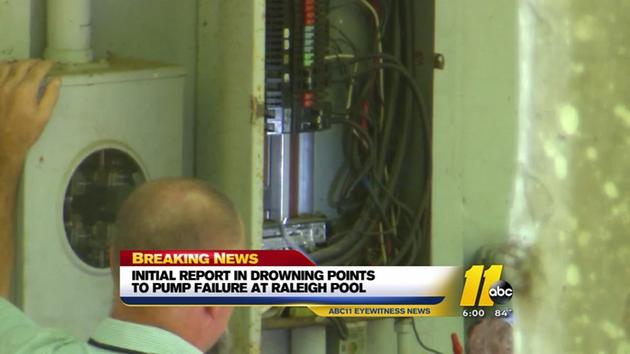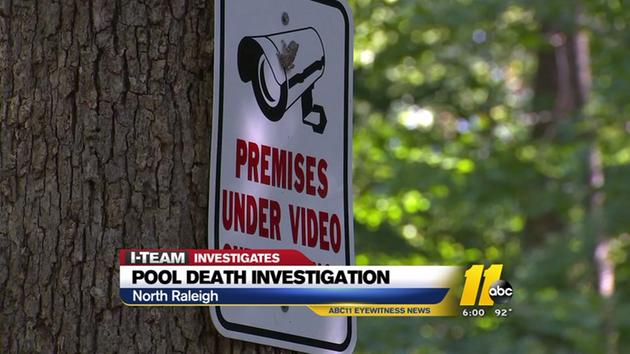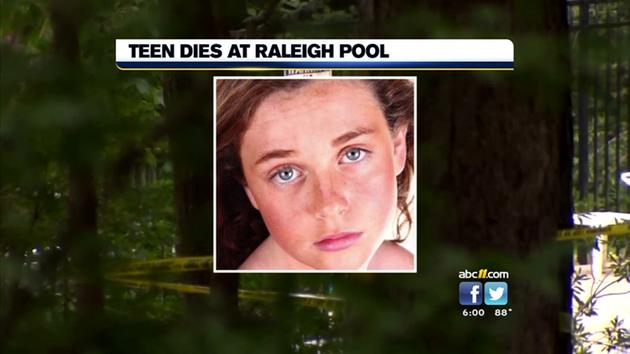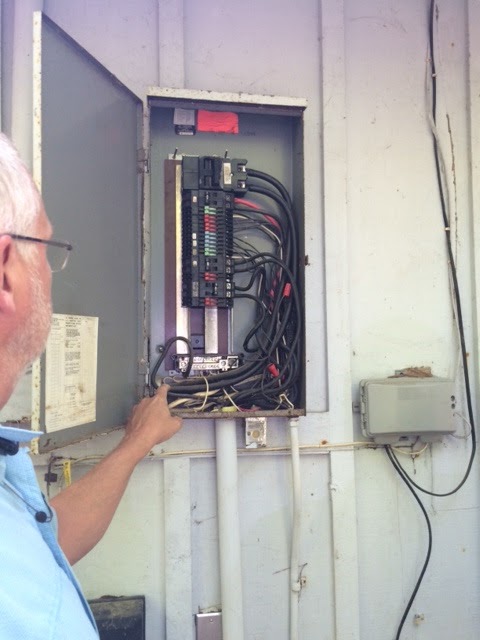


Initial report in drowning points to pump failure at Raleigh pool

Authorities examined the equipment at Heritage Point Pool (WTVD)
Monday, September 12, 2016 06:48PM
RALEIGH (WTVD) -- An initial report from the Wake County Inspections Administrations says a pool motor failure and a broken conductor led to the death of a teen lifeguard in Raleigh.
Rachel Rosoff, a senior at Enloe High School, was on duty and alone when a fellow employee showed up for work and found her floating face down in the water on September 3.
The report outlines everything investigators uncovered at Heritage Point Pool.
The pool was installed and permitted in 1979. Since then, no other construction permits have been filed.
The inspector cited a number of actions that, while unpermitted or not up to code, did not lead to the water being electrified. Among them, he found an unknown contractor repaired the electrical feeder to the pump in 2011 without the required permit. Also, a motor bonding wire had been cut and loosely wrapped around the equipment bonding wires, which does not comply with National Electrical Code.
In his conclusion, the inspector found the pool pump motor failed and when it faulted to ground, the grounded conductor was broken, causing the current to travel into the water and pool equipment.
"Since this conductor was open (broken) it could not conduct the necessary current to cause the overcurrent device (breaker) to open (trip)," Gregory Vance, Inspections Administrator, wrote. "The fault current then followed the only path available to it, the pool water, creating a voltage gradient across the pool and pool equipment."
The investigation was conducted at the request of the Wake County Sheriff's Office.
The NC Dept. of Labor, Occupational Safety and Health Division is also carrying out its own investigation to find whether safety or health standards were violated at Heritage Point Pool.
Read the full report here.

Authorities release the scene, but are still searching for clues as to why a pool became electrified.
========
DATE: September 9, 2016
FROM: Gregory A. Vance, Inspections Administrator
TO: Investigator W. O’Neal, Wake County Sheriff’s Office
RE: Investigation of Wiring at Heritage Point Community Pool
On September 6, 2016 Wake County’s Chief Electrical Inspector and Inspections
Administrator met with representatives of the Wake County Sheriff’s Office, the North Carolina Department of Labor, Occupational Safety and Health Division, Aquatic Management Group and Future Connections Electrical, Inc. at Heritage Point community pool to investigate the electrical wiring pursuant to the drowning death that occurred on September 3, 2016. The investigation and this
report were performed at the request of the Wake County Sheriff’s Office.
The pool was originally installed in 1979 and permitted under Wake County permit number A016724. There are no subsequent construction permits related to the pool or pool equipment on record. At the time of original installation of the pool, the 1978 National Electrical Code (NEC) was in effect. Unless otherwise noted, all code references are to that edition.
The investigation found that the pool pump was fed underground from a house panel (see image 1) located on the exterior of the community club house. The electrical feeder consisted of three conductors (two ungrounded and one grounded), typical of electrical practices of the period and compliant with NEC 250-61(a). Overcurrent at the panel was a 60 ampere breaker and conductors were #4 aluminum. The insulation type could not be identified. The electrical feeder to the pump had been repaired (see image 2) in 2011 per the representative of Aquatic Management Group.
Approximately 5 feet from the pool house, the old electrical feed had been relocated above ground, spliced to new type URD #2 aluminum conductors and the new conductors ran to the existing fused disconnect in the pool house. The County has no knowledge of who performed this work. Such work requires an electrical permit per N.C.G.S. 153A-357.
Representatives of Future Connections Electrical tested the grounded conductor of the electrical feeder to the pump for continuity between the house panel and the pool house disconnect and found that the conductor was open (broken/could not conduct electricity). They then tested to the junction at the repair and the conductor was still open indicating a break in the original ungrounded conductor installed in 1979.
Representatives of Future Connections Electrical located and excavated the break in the conductor (see image 3). The conductor was fully corroded and unable to conduct electricity. The electrical feeder terminated in a 60 ampere fusible disconnect (see image 4) inside the pool house. The disconnect was fused as 40 amperes on one leg and 60 amperes on the other leg. The disconnect appeared to be in proper working order and the overcurrent was set to within acceptable limits for code compliance.
From the disconnect, the motor branch circuit ran to a timeclock controlled motor starter and then to the motor. This branch circuit consisted of three conductors (two ungrounded and one grounding).
The conductors were #6 copper. The insulation appeared to be type THHN. The conductors appeared to be properly terminated in the disconnect, the motor starter and the motor.
Representatives of Future Connections Electrical tested the ungrounded conductors feeding the motor at the motor starter and found that phase A had faulted to ground. The motor bonding wire was terminated properly at the motor but had been cut and loosely wrapped around the equipment bonding wires (see image 5).
This alteration was located behind piping concealed from normal view. This is not compliant with NEC680.22 that required all metal parts of the pool structure, metal fittings, metal piping and fixed metal parts within five feet of the inside walls of the pool, and all electric equipment associated with the pool water circulating system, including pump motors to be bonded together.
However, it was discovered that an alternate electrical path provided a connection to the motor bonding wire and it was determined that the cut wire noted above did not contribute to the electrical charge in the pool. Furthermore, the function of the pool bonding system, in accordance with NEC 680.22, could not be verified at the time of the investigation.
It is my conclusion that, the pool pump motor failed and phase A faulted to ground. The underground feeder had an open ungrounded (neutral) conductor. The only load on this feeder is the 230 volt pump, therefore there was no indication that the ungrounded conductor had failed. Article 250-61(a) of the 1978 NEC states “A grounded circuit conductor shall be permitted to ground noncurrent-carrying metal parts of equipment . . . on the supply side of main disconnecting means of separate buildings. . .” This is intended to provide an effective ground-fault current path.
Article 100 of the 2014 NEC defines effective ground-fault current path as “. . . a low- impedance circuit facilitating the operation of the overcurrent device . . .” When the phase A faulted to ground, the intended path for fault current was the grounded(neutral) conductor. Since this conductor was open (broken) it could not conduct the necessary current to cause the overcurrent device (breaker) to open (trip). The fault current then followed the only path available to it, the pool water, creating a voltage gradient across the pool and pool equipment.
Gregory A. Vance
Inspections Administrator
Wake County PDI
==================
Officials release scene, seek clues in teen's pool death
RALEIGH (WTVD) --
The
Wake County Sheriff's Office is still searching for clues as to what
caused the community swimming pool where a 17-year-old lifeguard died
Saturday, to become electrified.Rachel Rosoff, a senior at Enloe High School, was on duty and alone Saturday when a fellow employee showed up for work and found her floating face down in the water.

"She was right up against the ladder, looking like she has almost just gotten in and something must have happened," the employee said in a 911 call.
WANT TO HELP RACHEL ROSOFF'S FAMILY? CLICK HERE TO DONATE ON GOFUNDME
A sign posted near the pool's entrance states the premises is under video surveillance. Sheriff Donnie Harrison told ABC11 that investigators were planning to return to the scene Wednesday to see whether the incident was caught on camera.
By late Wednesday afternoon, the sheriff's office released the scene, but said it's continuing to work alongside the NC Department of Labor and the Wake County inspections department.
The pool has passed county safety inspections the last two years. The county does not inspect or regulate electrical systems.
The state Occupational Safety and Health Division, under the labor department, said its investigation into whether health and safety standards were violated could last three to four months.
Heritage Point's Homeowners Association owns the pool. Professional Property Management, which runs the HOA, released the following statement to ABC11 on Wednesday:
"We are devastated to hear about this tragedy and our deepest sympathy is extended to the family. We are working to the fullest extent possible with investigators. At this time we are unable to comment further since this is an active investigation," said Brooke Hoff, of PPM.
=========================
Investigators work to find cause of electrified water
RALEIGH (WTVD) --
An investigation into what caused a young lifeguard to be
electrocuted and drowned in a neighborhood swimming pool seemed to
center around a breaker box attached to the pool clubhouse Tuesday.A preliminary autopsy released Monday revealed Heritage Point Pool where Rachel Rosoff, 17, died Saturday, had an electric charge and that may have knocked the Enloe High School senior unconscious.
Friends returning to school from the long Labor Day weekend placed flowers and messages on Rosoff's parking space.
An employee who went to the Heritage Point Pool after Rosoff for the next shift Saturday afternoon called 911 and told the emergency operator: "I just got in for my shift. I can't get into the pool. The water seems to be electrified," the caller explained. "Her cell phone is on the table here, and I can see where she texted someone to ask them a question about how to check something in the pool."
The caller said the lifeguard was floating face down in the water.
The Wake County Sheriff's Office is still investigating what caused the water to become electrified.

A large group of investigators, inspectors, and others crowded around the breaker box attached to the side of the pool clubhouse. One man removed the outer panel to take a closer look at the wiring inside.
One man who has not been identified, could be overheard saying, "Yeah, I'm scared to death. I've got somebody's- somebody's life on my hands."
ABC11 went to the experts at Raleigh's Rising Sun Pools who explained only new pools have to meet electrical code and pass bonding inspections.
"After that it's done, the opening inspections and the things that the county does before pools are opened, doesn't have anything to do with electricity because the electricals all underneath the concrete," said Tara Onthank, Rising Sun Pools owner. "Everything's buried."
TIPS FOR ELECTRICAL SAFETY AROUND POOLS AND HOT TUBS (.pdf)
Onthank said even some renovation work doesn't require permits or new inspections to see whether electrical wiring was impacted.
It's unclear whether Heritage Point Pool underwent renovations in recent years. Onthank said Rising Sun Pools quoted the owner for re-plastering work in 2012, but lost the bid.
Wake County inspections records show over the last two years, Heritage Point Pool received 8 demerits, all in 2015, for things such as trip hazards and improper storing of chemicals and equipment. The county does not regulate electrical components.
The North Carolina Occupational Safety and Health Division opened its own investigation to determine whether safety and health standards were violated.
OSH said Aquatic Management Group is the employer in the case. The company has declined to comment further than a prepared statement released Monday:
We are shaken by the loss of such a vibrant young life. Our deepest sympathy is extended to the family in this time of unfathomable grief. We are cooperating with investigators in every possible way and are hopeful that the investigation may provide an explanation for this tragedy.
================
911 caller said Raleigh pool where teen drowned was electrified
By Chris Cioffi
ccioffi@newsobserver.com
RALEIGH
A caller told a 911 dispatcher Saturday afternoon that he couldn’t try to help a 17-year-old girl found floating in a community pool because the water was electrified.
Rachel Anna Rosoff was electrocuted and drowned in the Heritage Point subdivision pool in North Raleigh, the Wake County Sheriff’s Office said.
The address of the pool is 2226 Valley Forge Dr, Raleigh, NC.
The 911 caller, whose name was not released, said he had just arrived for a shift at the pool and found Rosoff floating in the water.
He said he thought Rosoff, a lifeguard at the pool, had arrived for an earlier shift and was cleaning debris from the pool after a storm the prior night.
The caller said he tried to reach Rosoff but was shocked by the water.
“I realized immediately if I dive in there to get her out, I’m not going to be able to handle that shock and I might join her,” he said in the call.
He said he saw Rosoff’s cellphone on a table and it had text messages she had sent requesting instructions on how to check something in the pool.
Rosoff was a senior at Enloe High School in Raleigh, said Michael Yarbrough, a spokesman for Wake County schools.
The pool is managed by Aquatic Management Group, according to the 2016 Heritage Point pool rules. Someone who answered the phone at Aquatic Management Group on Tuesday declined to comment, citing an investigation.
In a statement Sunday, the sheriff’s office said results of a preliminary autopsy “are consistent with the decedent entering the pool that had an electrical charge that may have rendered the decedent unconscious apparently leading to drowning.”
Often times the pool lights malfunction, they draw high current due to faulty bonding/grounding and they cause the electrocution. This has happened several times this summer season alone.
Most of the time, it’s not the pool light that’s the problem, but the electricity flowing through to the other equipment. It flows through the bonding wire that connects all the metal components together—the pump, heater, lights, slide legs, dive stand, and handrail. Faulty bonding/grounding is the cause of many pool electrocution incidents.
Pool lights don’t have to be on to be a potential hazard. In fact, most problems come from incorrectly grounded or bonded lights, not from lights that are improperly powered. This can send electricity through a pool light even if it’s not on during the daytime. Anything that has electricity running to it AND is underwater is a potential hazard.
===================
Teen girl found dead in neighborhood pool in Wake County, officials say
By CBS North Carolina Published: September 3, 2016, 3:34 pm Updated: September 5, 2016, 12:41 pm
RALEIGH, N.C. (WNCN) — A teen girl was found dead in a neighborhood pool in the north Raleigh area on Saturday afternoon, officials say.
Wake County Sheriff Donnie Harrison told CBS North Carolina that crews responded just after 2:30 p.m. to an area near 2226 Valley Forge Road for reports of an electrocution and/or possible drowning.

Authorities said that a 17-year-old female was found dead in the pool and pulled from the water. However, authorities said they could not confirm how she died.
Officials said electrocution was possible, but the girl might have died from natural causes. The teen’s name will not be available until after relatives are contacted.
“This incident occurred at the community pool in the north Raleigh subdivision of Heritage Point, at some point between the hours of 9:00 a.m. and 2:30 p.m.,” Wake County officials said in an email.
The Sheriff’s Office is requesting that if anyone has information that would aid in the investigation to please call 919-856-6911.
Duke Energy confirmed that a power line was down in the area, but the line was not property of Duke, a company official said.
Neighbors say the pool opens up before noon on Saturday’s and usually has a lifeguard. Harrison said that an autopsy would be conducted Monday to determine a cause of death.
The swimming pool is located east of Creedmoor Road and just south of I-540 — just outside the Raleigh city limits.
======================
Investigators say 17-year-old girl found dead in pool was electrocuted and drowned
RALEIGH, NC
Investigators think a 17-year-old girl who was found dead in a community pool Saturday was electrocuted and drowned, according to the Wake County Sheriff’s Office.
The girl has been identified as Rachel Anna Rosoff, the sheriff’s office said in a news release Monday afternoon.
The incident happened about 2:30 p.m. Saturday at the Heritage Point subdivision pool. The address of the pool is 2226 Valley Forge Dr, Raleigh, NC.
Results of a preliminary autopsy “are consistent with the decedent entering the pool that had an electrical charge that may have rendered the decedent unconscious apparently leading to drowning.”
Investigators are still waiting for the results from the official autopsy.
P.P.M., Inc.
Heritage Point is proudly managed by Professional Properties Management of Raleigh, Inc. (PPM)
Community Manager:
Kristina Goodman
11010 Raven Ridge Road
Raleigh, NC 27614
How do I make sure my pool is safe?
There’s only so much you can do about a pool over which you do not have dominion. If you’re worried about your children using a public pool, you can ask a manager about whether or not the electrical work has all been up to code, but I’m not sure if you can depend on that person to be 100% forthcoming. But when you have your own pool, there are a few things you can make sure of:If you haven’t already, you can make the switch from 120V lights to 12V pool lights that run through a pool light transformer. The transformer works in conjunction with the GFCI protected circuit breaker and the pool light junction box and steps the voltage way from 120 to 12. The 12V lights are safer when installed properly by a licensed electrician.
ALWAYS get a permit when performing electrical work in your pool, pool lamp replacements included. A permit may cost some money, but it means that someone will have to check your work and be sure that it is safe.
There are a few electrical related pool jobs that are DIY friendly, like replacing pool light bulbs. If you have to replace the whole lamp socket or are upgrading to LED pool lights, you’ll want to get a licensed electrician to do the work. Electricians can help you install low voltage pool lights that work alongside a transformer on a GFCI circuit that is grounded and bonded.
Pool lights reach the end of their service life at around 20-30 years. Get a licensed electrician to replace them when they stop working.
Building Permits for Your Pool
If you think your pool was built without permits or wired by someone who may not have known what they’re doing, hire an electrician that can certify its safety or bring it up to code. If you purchase a house that has a pool built before 1975, do the same.In the event that someone has been shocked in the pool, don’t use a metal pole like the ones that attach to your skimmer or pool brushes—they’ll conduct electricity and shock the user. Likewise, don’t go jumping into the water, as the person jumping in also runs a risk of serious injury.
Instead, shut off all the power to the pool at the breaker box before making an attempt to save the victim. Work quickly as they have probably become submerged in the water.
To sum up, remember that anything electrical used in conjunction with water can be very dangerous, but it doesn’t have to be life threatening. Whether you’re building a pool, repairing electrical elements, or bringing an older pool up to code, just make sure whoever works on it is doing proper wiring, grounding, and bonding. Your pool light breakers and other power outlets SHOULD be on a GFCI protected circuit. Get a permit for any electrical work needed around the pool to protect yourself and your loved ones.










